Burma coup resistance notes May 6, 2023
Electricity & water shortages become dire; neighboring countries & international brokers ignore Myanmar people, instead mistaking shrinking terrorist regime for a government.
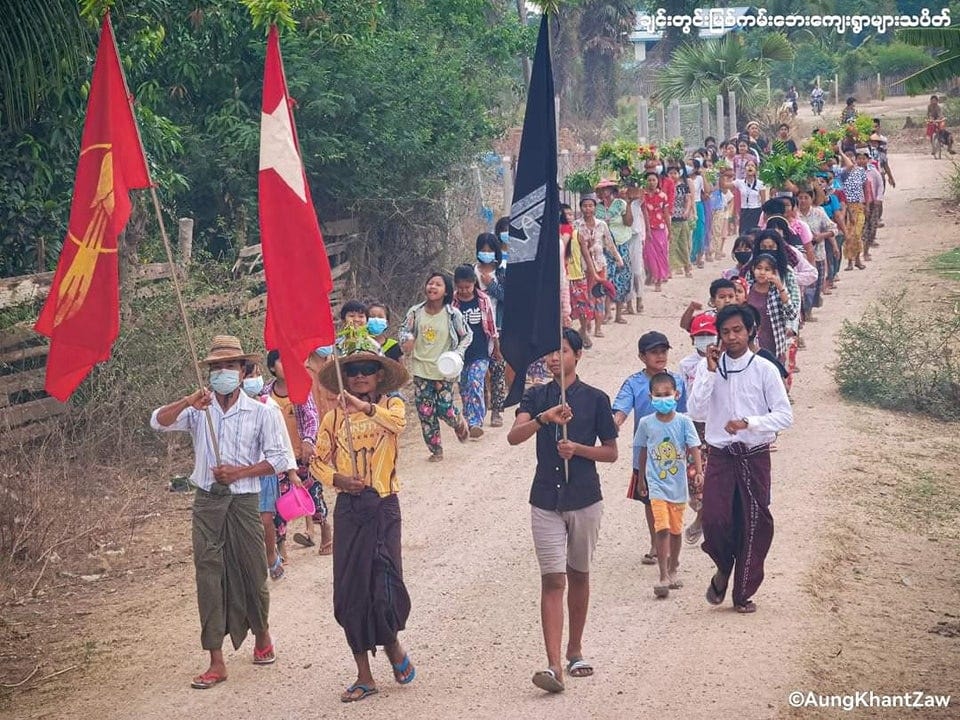
Ethnic regions-------------------
Junta officers, including senior officers, are dying in growing numbers. During April alone 20 senior officers were killed, including 3 colonels, 6 lieutenant colonels, and 8 majors. They are getting killed in Yangon, Sagaing Region, and Karen, Karenni, and Shan States. A colonel was killed in Chin State on May 5. (Khit Thit Media 5/6) A rare new officer, a Major, was killed on April 29 in Shwe Kokkol, Kawthoolei while impersonating a Karen army soldier. He had just finished training.
The Kachin army suddenly captured 2 junta camps in Hommalin Township on May 4 in a surprise attack. Weapons were captured, junta troops ran away. (People's Spring 5/4) This was after PDFs in Hommalin captured 4 remote police outposts on April 29. (People's Spring 4/29)
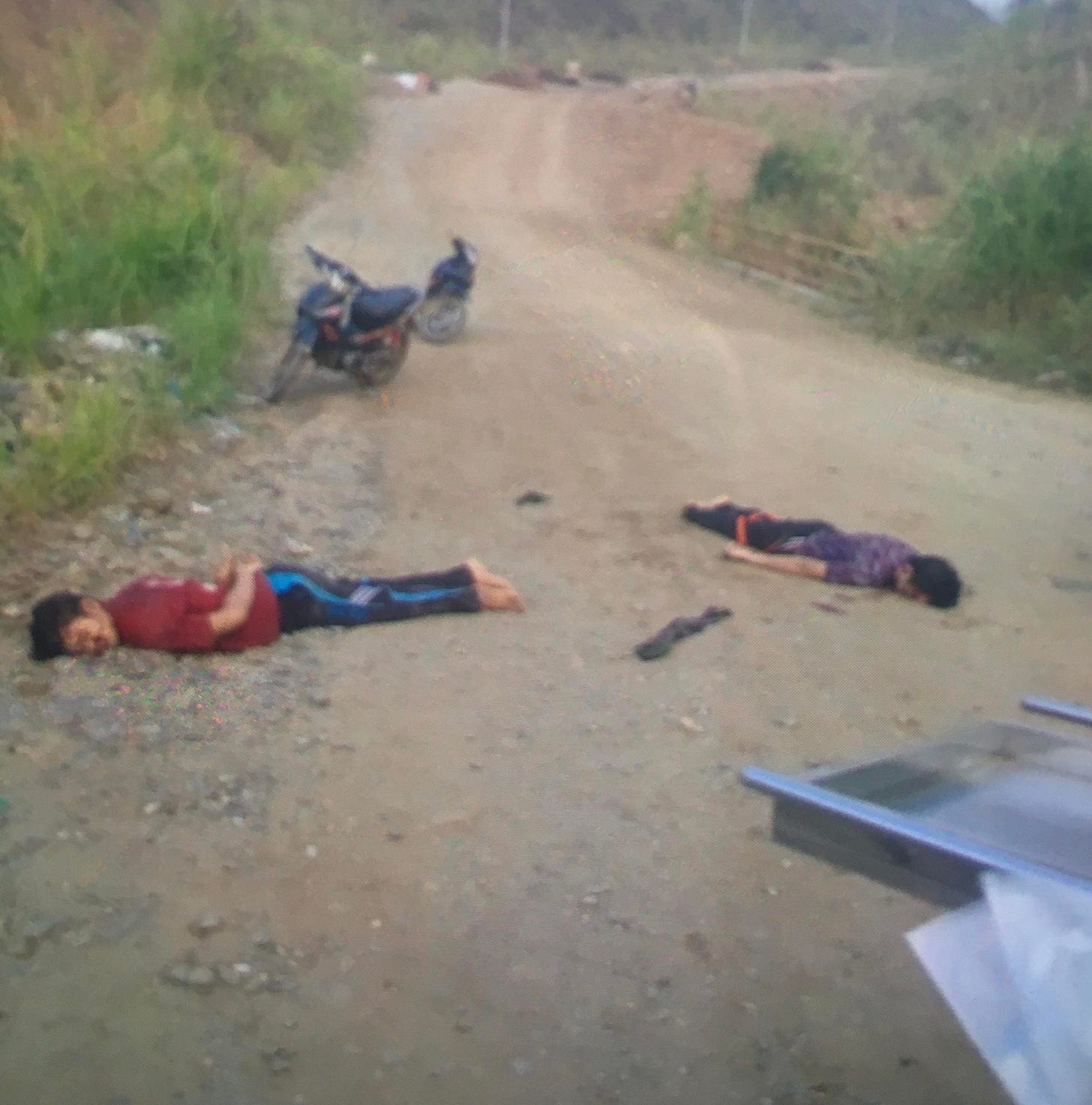
Karenni defense forces attacked 4 separate junta targets in Bawlahke on May 1. During a 2-hour battle, 7 junta troops were killed, 13 wounded, and weapons were captured, while 2 Karenni soldiers were killed and 4 wounded. As the junta suffers large losses on the battlefield, it is increasingly targeting civilians, according to Karenni forces. Jets pick out and bomb refugee camps, and ground troops fire mortars into towns. (People's Spring 5/3)
Chin defense forces attacked a column of junta reinforcements coming to Hakha from Gangaw on May 1, killing 20 of them and capturing guns, grenades, mortars, phones, and other equipment. (Khit Thit Media 5/2)
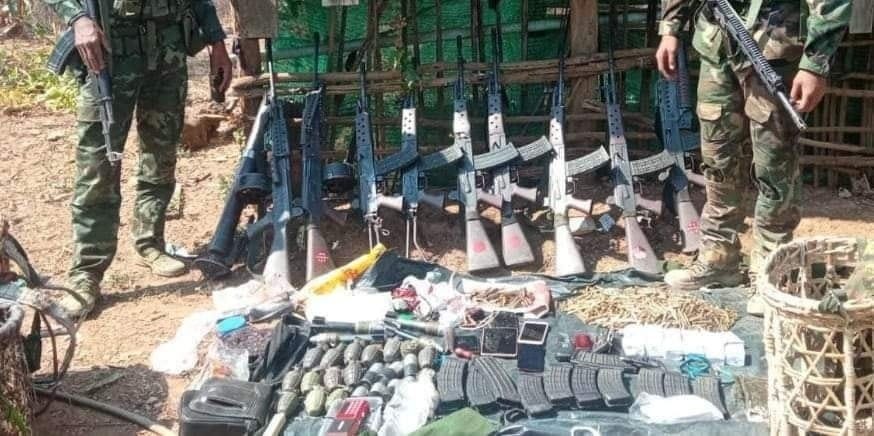
Junta soldiers captured at the battle of Vaar in Chin State said it would not be safe for them to return home or to their junta units if they were released by the Chin forces, so they will remain in Chin State during the war, regardless. In a video of their interrogation, some of them said they were forcibly recruited into the junta military, arrested and given a choice between jail or the army. Some had tried to escape before they were captured. Fourteen were captured alive at Vaar on April 10. (People's Spring 5/3)
Junta troops are trying to recover the 2 lost armored vehicles at Chunjone village near Hakha, Chin State, so Chin forces destroyed them even further on May 1, and killed at least 3 of the surviving 40 junta troops (out of the original 200). They were part of a convoy coming from Kalay that was wiped out during March and April.
The Karen army repulsed an attempt by junta troops to retake their lost camp at Mae Ka Hta in Mutraw District. Junta jets have been bombing both the camp and Karen civilian communities, causing deaths and injuries. (Mizzima 4/29) The Karen army then attacked a junta proxy BGF camp on May 2, killing 6 enemy troops and capturing weapons, but suffering 2 killed and 5 wounded on the Karen side. (People's Spring 5/4) Further south in Dooplaya District, the Karen Cobra Column repulsed another junta attack at Mekanei in the outskirts of Myawaddy on April 29, killing 5 troops including a Major. They captured weapons and a drone jammer.
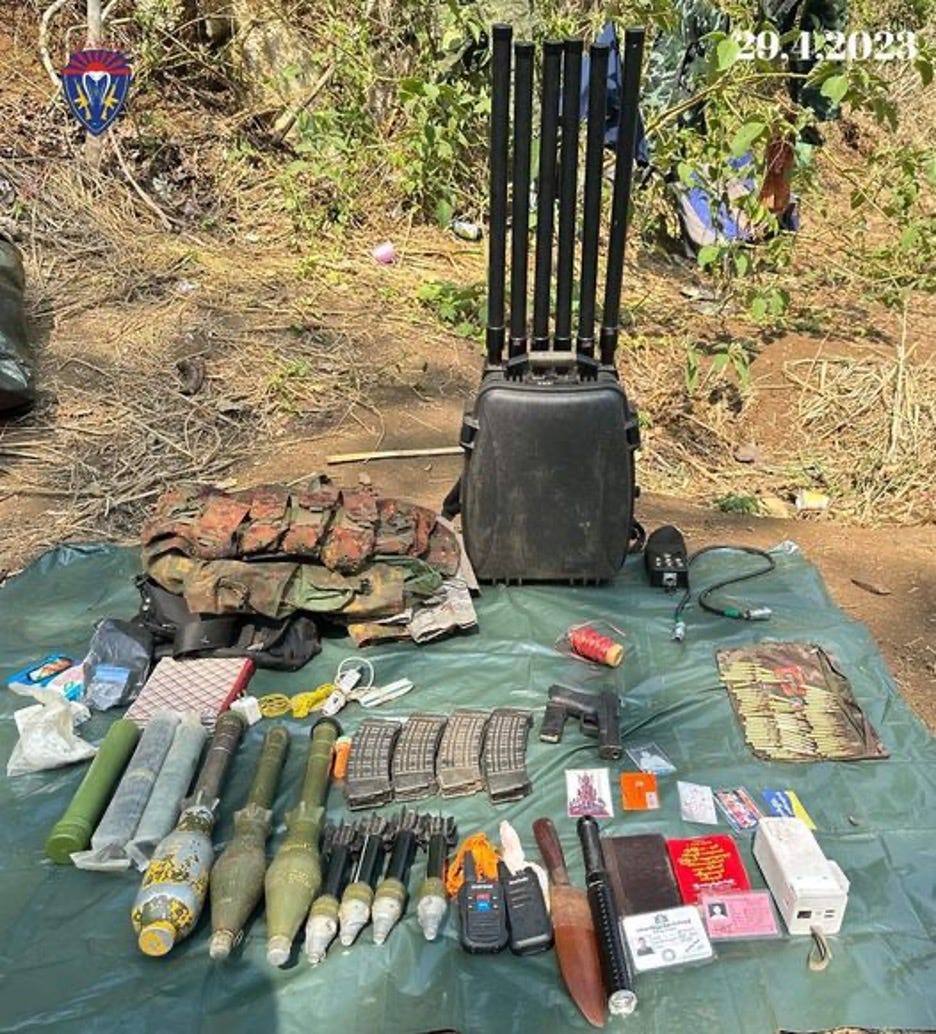
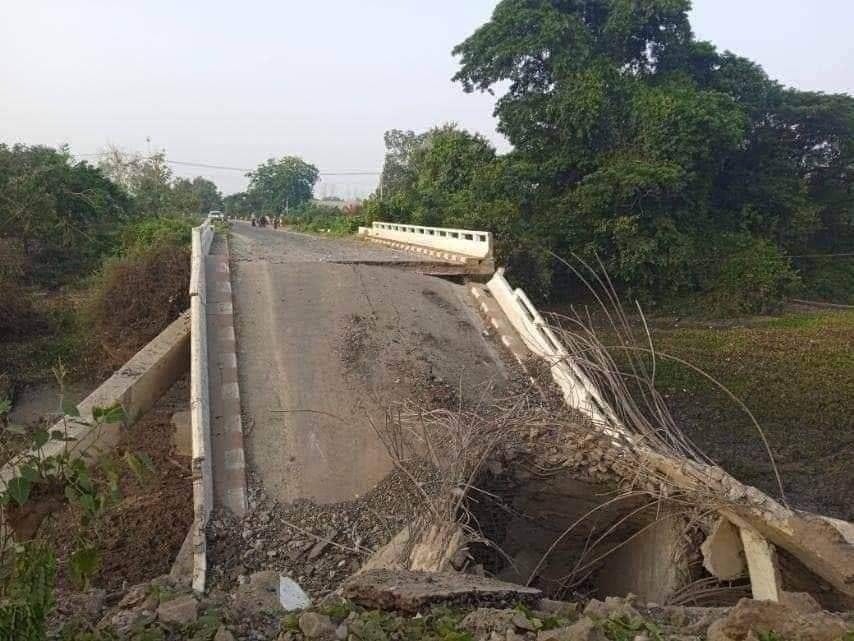
Junta scorched earth village terrorism campaign---------------
Losing the war against the armed resistance, junta troops continue to attack civilian soft targets. They burned at least 12 villages this week in Pakokku, Sagain, Maddaya, and Ye Oo townships, and demolished a high school in Ye Oo Township.

Junta jets scouted a refugee camp in west Demawso Township of Karenni State, then came back and bombed and strafed it, on April 29, injuring some civilians. Since the junta knew exactly what was there, it was purely a military attack on a soft civilian target. (People's Spring 4/29)
Local PDFs in Paziji have arrested 4 dalans responsible for informing the junta of the April 11 gathering there that led to the air strike that killed 170 civilians. The dalans have been handed over to the NUG Ministry of Justice for prosecution of war crimes. (People's Spring 4/29)
PDFs in Mandalay Region’s Thabeikjin Township counter-attacked junta troops burning and looting villages there on May 5, killing 10 of them. (Khit Thit Media 5/6)
People’s Defense Forces (PDFs)-----------------
Junta troops invaded Paziji in Kantbalu Township after dropping bombs that killed 170 civilians there on April 11. They burned Paziji and neighboring villages. Sagaing PDFs fought back, however, and drove the enemy out on April 30, killing or wounding 25 troops and capturing one alive. The junta commander lost a hand in the fighting. (People's Spring 5/3)
In Magway Region, PDFs attacked and killed 10 junta troops traveling in a civilian vehicle on May 4. A day later they pulled 4 junta troops off a passenger bus and killed them. (Khit Thit Media 5/4, 5/5)
In Mandalay Region, PDFs assaulted a junta road checkpoint in Myinchan Township, killing 6 junta troops, 3 police, and 3 Pyu Saw Htee terrorists on April 29. In Thabeitjin Township, a truck carrying wounded junta troops from a battle in Tagaung was hit repeatedly by roadside bombs, killing 15. (Khit Thit Media 4/29)
Recently, when junta troops capture PDF members, their habit is to cut their heads off. The latest instance was a PDF commander in Sagaing Township beheaded and disemboweled. (Myanmar Now 5/2)
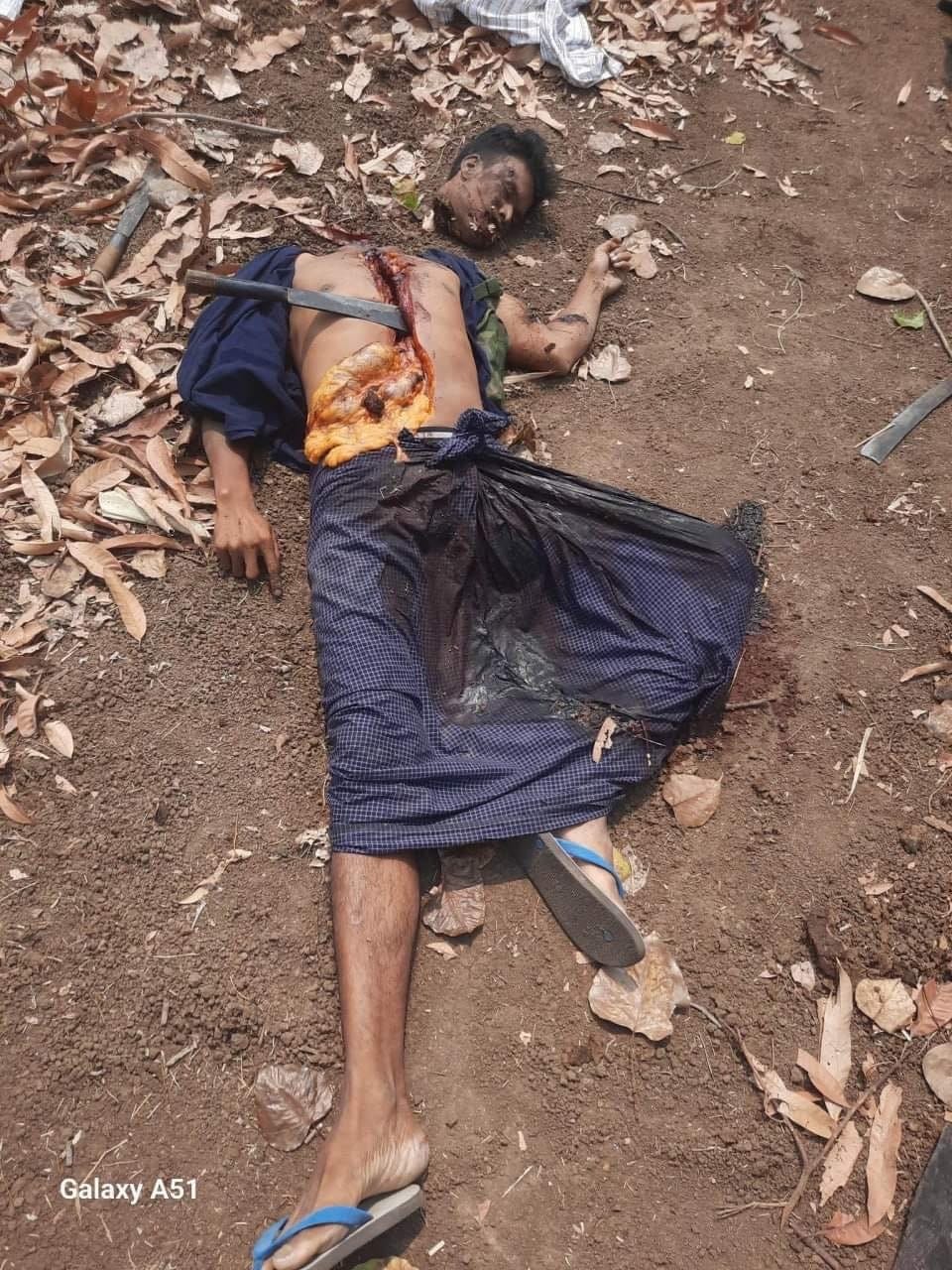
A local humanitarian committee in Sagaing Region built 700 temporary houses for families burned out of their villages by junta terrorist attacks. (Mizzima 5/2)
Urban warfare------------------
An urban PDF attacked the main government office in Pyijidagon, Mandalay on May 3, killing or wounding at least 5 soldiers guarding the place. (Mizzima 5/4) This means that urban PDFs in Mandalay are alive and well after repeated purges by the junta.
PDFs also mounted coordinated attacks on troops guarding two junta government offices in Monywa city, capital of Sagaing Region, on April 29, killing 5 of them. Four PDF soldiers were wounded. (The Irrawaddy 5/2)
Urban guerrillas assassinated retired junta major Ye Min Than in Bahan Township of Yangon on April 29. He was an active supporter of the regime. (The Irrawaddy 4/29)
Political and economic-------------------
The NUG has begun collecting regular taxes in liberated areas, with local implementation by PDFs under NUG command. This makes the NUG more like the regular national government, and provides it with a budget for activities such as finishing off the illegal regime, assisting Burma’s 1.8 million refugees, and providing educational and health services. (Mizzima 5/2)
Two-thirds of Myanmar businesses are avoiding the banking system, according to a survey carried out by the World Bank. Business people have no confidence in banks’ solvency and fear the control that the illegal regime has over bank operations and user information. (People's Spring 4/29) This would mean that businesses have reverted to a cash-only economy, another sign of how far backward the coup has driven the country.
Two years behind schedule, the Kawthoolei government (KNU) held its four-year congress and elected new leadership. The new KNU President is Padoh Saw Kweh Htoo Win from Brigade 4, who was involved in the National Ceasefire Agreement negotiations in 2015 but who has since adopted a strong defense policy against Burmese aggression. The KNU Vice President is Padoh Saw Se Gay, who has the support of the strong defense bloc in Brigades 2 and 5; he is also in charge of the Ministry of Defense. The KNU Secretary is Padoh Saw Tadoh Mu, who is from the old guard pro-NCA faction. All the Karen leaders now agree, however, that the NCA is dead and the KNU must fight to defend Kawthoolei. Naw Myaing Poe was elected as KNU Chief Judge. Meanwhile, the KNU is investigating 5 of its own senior members for possible corruption in relation to the Shwe Kokkol illegal gambling and human trafficking hub, after an outcry by international Karen organizations. (Salween Press 5/3)
Dictator Min Aung Hlaing issued a decree banning almost all imports on May 4, due to a dire shortage of foreign currency following the Feb. 2021 coup d'état. Fuel shortages are already causing near round-the-clock electricity blackouts and water shortages in cities. (Khit Thit Media 5/4) The importation of aviation fuel for the terrorist air strikes on civilians is not affected, however. The junta enforces an artificially low kyat-dollar exchange rate and other draconian controls that discourage international trade. Now the country is effectively cut off from the world economy.
Young women workers in junta-owned textile factories in Yangon have been shipped to Naypyitaw to be domestic servants for junta officers, washing clothes, ironing, cooking, and compelled to provide sexual services. Those who refuse can lose their jobs and be punished in other ways. This has apparently been going on for years. (Ayeyarwaddy Times 5/3)
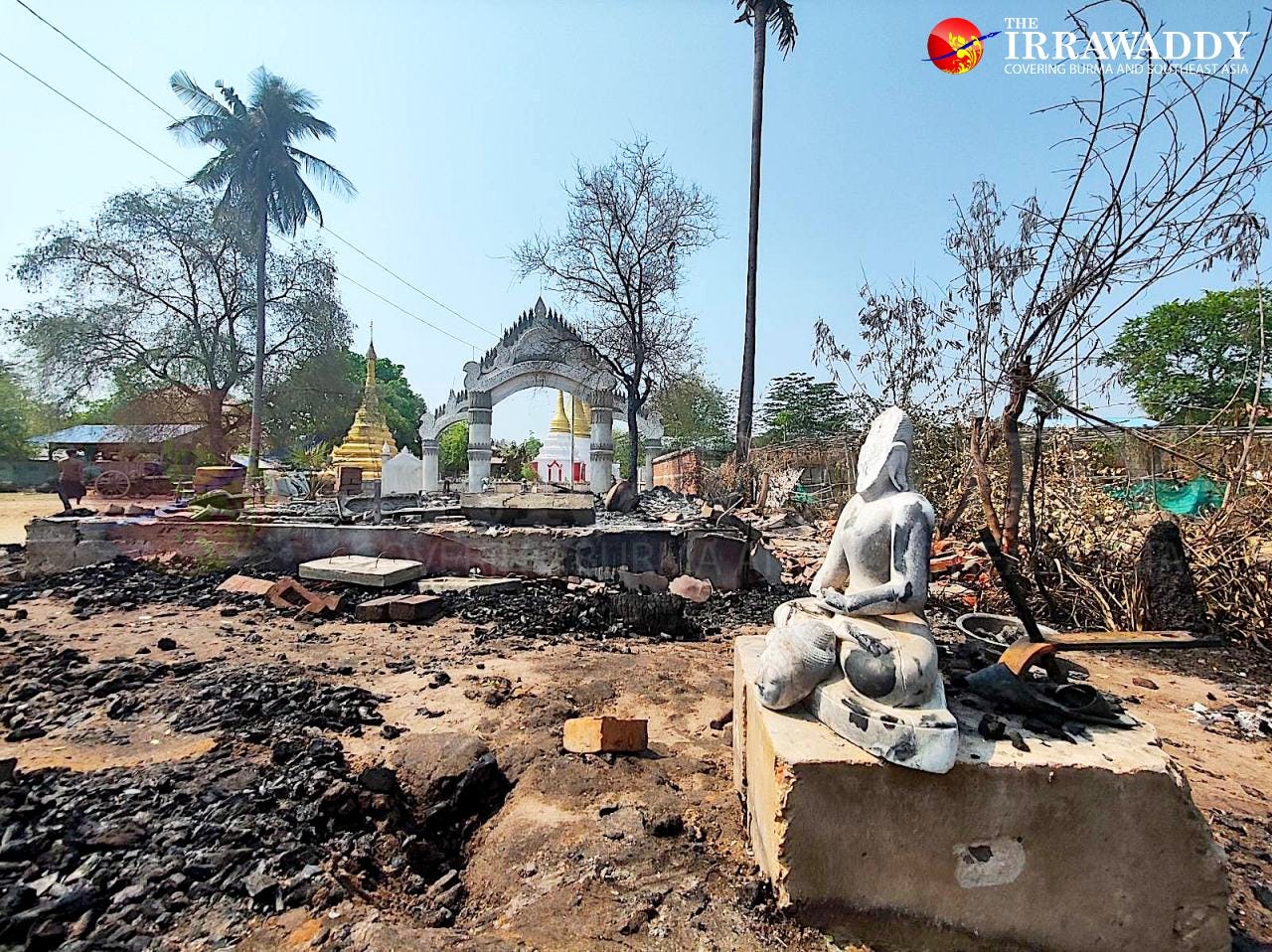
A day late and a dollar short, former UN Secretary General Ban Ki-moon held an on-line meeting with members of the NUG on April 27, after he had visited – in person – illegal coup dictator Min Aung Hlaing. The NUG insisted that it be consulted before any future visits with the rogue regime in Naypyitaw, and said that elections could only be held under the newly-drafted constitution, not by the Naypyitaw regime. (Mizzima 4/30)
UN Special Representative for Myanmar Noeleen Heyzer was working against the country again this week, meeting with the Chinese Communist Party’s foreign minister to listen to his pro-junta policies. (Khit Thit Media 5/2) China wants no international assistance for the pro-democracy movement, calling the current genocide an “internal affair,” and instead recommends “negotiations” with the terrorist regime.
Meanwhile, India has been hosting talks among Burma’s border countries aimed at controlling the instability in Burma that can affect them. (Ayeyarwaddy Times 5/2) But again, the talks don’t include the people of the country itself, so they have little or no relevance.
Across Burma the regime is increasingly unable to generate electricity; the lights are on 1-4 hours per day. In Yangon and Mandalay there is little or no running water, and people are queuing around tank trucks that deliver river water sporadically, and flocking to the Yangon and Irrawaddy Rivers to bathe and wash clothes. (Myaelatt Athan 5/3) The military coup has driven the country back to pre-industrial conditions.
Border trade between Myanmar and Thailand is about 1/3 of normal, due to factors such as the ongoing war around Myawaddy, the high price of fuel, and the junta’s artificially low kyat-dollar exchange rate. Trucks getting burned and destroyed during fighting on the Asia Highway increases risk, so shippers add war insurance. The insurance, higher fuel cost, and artificial exchange rate make much border trade unprofitable, and the danger of losing vehicles and merchandise also discourages shipping. The implications for the border and national economy are serious. (The Irrawaddy 4/30)
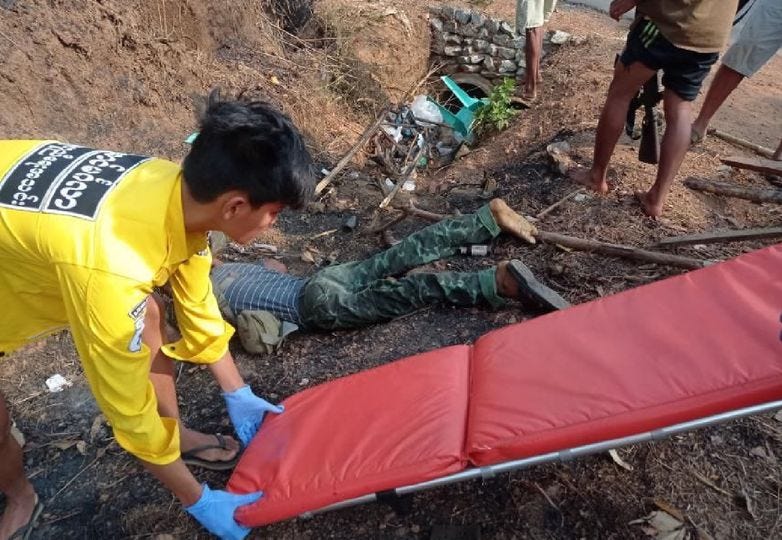
The Revolution’s ability to police itself is being put to the test in Chaung Oo Township of Sagaing Region. Last August 4 rogue PDF members seized 7 youths, age 15-21, whom it accused of being dalans, and instead of submitting them to the NUG’s justice system, took them out and raped and killed them. The four females among the victims were sexually assaulted, and 3 of them were 15 years old. All 7 were summarily killed. The 4 PDF members have admitted to the crime, but up until now they are still free. The NUG is promising punitive action. The NUG’s power is exercised locally through the PDFs, but when PDF members themselves are the perpetrators of crimes, there appears to be an enforcement gap. (Myanmar Now 5/3)
-စီၤ ထံဆၢ



